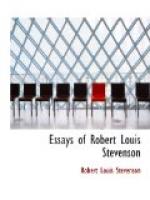Walter Scott is out and away the king of the romantics. The Lady of the Lake has no indisputable claim to be a poem beyond the inherent fitness and desirability of the tale. It is just such a story as a man would make up for himself, walking, in the best health and temper, through just such scenes as it is laid in. Hence it is that a charm dwells undefinable among these slovenly verses, as the unseen cuckoo fills the mountains with his note; hence, even after we have flung the book aside, the scenery and adventures remain present to the mind, a new and green possession, not unworthy of that beautiful name, The Lady of the Lake,[29] or that direct, romantic opening,—one of the most spirited and poetical in literature,—“The stag at eve had drunk his fill.” The same strength and the same weaknesses adorn and disfigure the novels. In that ill-written, ragged book, The Pirate,[30] the figure of Cleveland—cast up by the sea on the resounding foreland of Dunrossness—moving, with the blood on his hands and the Spanish words on his tongue, among the simple islanders—singing a serenade under the window of his Shetland mistress—is conceived in the very highest manner of romantic invention. The words of his song, “Through groves of palm,” sung in such a scene and by such a lover, clench, as in a nutshell, the emphatic contrast upon which the tale is built. In Guy Mannering,[31] again, every incident is delightful to the imagination; and the scene when Harry Bertram lands at Ellangowan is a model instance of romantic method.
“‘I remember the tune well,’ he says, ’though I cannot guess what should at present so strongly recall it to my memory.’ He took his flageolet from his pocket and played a simple melody. Apparently the tune awoke the corresponding associations of a damsel.... She immediately took up the song—
“’Are these the links of Forth,
she said;
Or are they the
crooks of Dee,
Or the bonny woods of Warroch Head
That I so fain
would see?’
“‘By heaven!’ said Bertram, ‘it is the very ballad.’”




